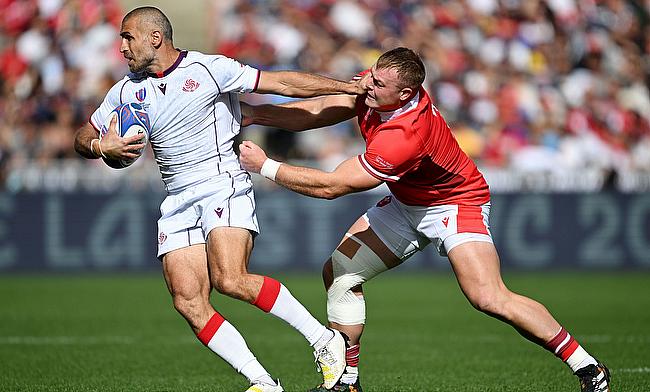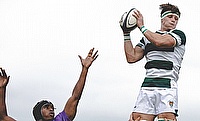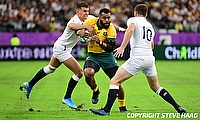Between rebuilding and dreaming: What’s next for Georgia?

Georgia and Wales met at last year's World Cup but a developing Lelos want more opportunities to test themselves
©Photo by Pauline Ballet - World Rugby/World Rugby via Getty Images
Legacy.
There’s no better way to describe what Georgia have built in the Men’s Rugby Europe Championship for the past 20 years, especially in the last 10.
On Sunday the 17th of March of 2024, the Lelos reigned supreme yet again and conquered their seventh consecutive Men’s REC, reaching an impressive mark of 16 titles in the competition.
But what does it mean for Georgia in the bigger picture? What should be next?
After Levan Maisashvili’s successful reign – four Men’s REC titles and notable victories against both Wales and Italy in 2022 - Richard Cockerill took the job and was able to keep the Georgian boat sailing in the right direction, finishing the European tournament unbeaten.
Even after a slow start, with a narrow victory against Germany (28-17), the Lelos convincingly defeated Spain, Romania, and Portugal, scoring 17 tries and conceding only two.
Although there were similarities with their 2022 and 2023 seasons, there were a couple of major differences in 2024, starting with the revamped pack.
The Lelos opted to select an internationally inexperienced front row, joining Giorgi Akhaladze, Vano Karkadze, and Irakli Aptsiauri, well-known players in France.
From the first minute, the trio were able to assert their dominance – only Romania could really compete with them. In the final against Portugal, it was a clear weapon. Seven scrum penalties won.
With the likes of Beka Gigashvili (who still has at least one more World Cup in him), Mikheil Nariashvili, and Shalva Mamukashvili nearing their final years as international players, it was the right decision to invest in the future, adding at least three new names to the front-row player pool.
The insane depth in the Lelos will push them to start touching the ceiling, something they began back in 2017.
Since then, the new generations have progressed and become household names for the team. Players such as Beka Gorgadze, Lasha Jaiani, Luka Invanishvili, Tornike Jalagonia, Gela Aprasidze, Mirian Modebadze, Demur Tapladze, and the insanely talented Davit Niniashvili.
So far in 2024, the Georgian staff haven’t shied away from handing out more debuts. The 19-year-old outside back, Luka Tsirekidze (who you will be seeing in the upcoming U20 World Championship) and scrum-half Davit Khuroshvili were two of the six new debutants earning their first caps.
It is clear there is an ongoing successful rebuild for the now 16-time Men’s REC Champions.
Georgia’s prowess to capture talent and turn them into full-blown stars has also touched the 7s scene, with Akaki Tabutsadze being the most successful story out of them. In 2023, the Black Lion franchise promoted yet another 7s unit, as Giorgi Jobava accumulated his first minutes in the XVs and he might be in contention to become a Georgian international in the next couple of years.
The Georgian system has also worked wonders for players who seemed to have fallen away from the Test match picture.
Ilia Spanderashivili, who was one of the most promising loose forwards in 2018, clawed back to earn another shot, grabbing more than a couple of Player of the Match displays in the Rugby Europe Super Cup and was gifted another opportunity in 2024 to play Test matches for Georgia.
The result?
Five starts, two tries, two Player of the Match awards, and an overwhelming physicality that trampled opponents.
After the conclusion of the 2024 Men’s Rugby Europe Championship, 33 players played at least one game, with the coaching staff promoting seven debuts, making the best use of the competition.
By further deepening their player pool, Georgia is trying to create an unbreakable team that can still dominate and win even if they are missing a couple of their main stars. But will it be successful? That will depend on challenges that lie ahead, or, to put it in simple terms games against the top nations.
Last week, Georgia’s invitation to play Wales this autumn excited the rugby community on social media. Given the Lelos’ dominance of the Men’s REC and Wales’ poor Six Nations campaign, it is a fixture many would like to see.
Of course, it wouldn’t be a ‘Six Nations relegation play-off’ should it even occur but it would be compelling and perhaps give rugby’s bosses something to think about if they are looking to grow the game in Europe.
Georgia’s performances in the last two World Cups have been underwhelming but the bigger picture is if they are to become a real behemoth of the sport, they need to be put to the test against England, Ireland, France, Wales, South Africa, Australia, and others more often.
Yes, it is the same story for all the emerging nations, but more specifically for Georgia and Fiji, who have built franchises from the ground up, developed trustworthy and talented youth teams, and have more than 50 quality Test match players to pick from.
If the Georgian dream in the last four-year cycle was to take some Tier 1 scalps and remain the Men’s REC champions, then in this next one, their sights must be set on continuing to be a clear threat to the most powerful nations in the rugby world.
The introduction of a Six Nations relegation play-off would be a significant step towards this and it could potentially be invaluable for the growth of rugby in Europe, but right now, that path isn’t open.
With a new Rugby World Cup cycle starting, Georgia needs to test itself at the highest possible level, not only to achieve greatness but to also benefit and flourish from a rebuild phase that aims to create the best-ever Georgian squad.









